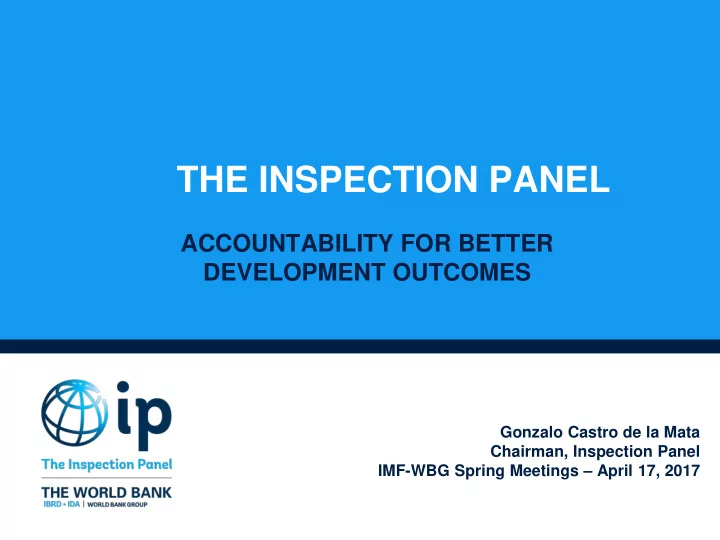

THE INSPECTION PANEL ACCOUNTABILITY FOR BETTER DEVELOPMENT OUTCOMES Gonzalo Castro de la Mata Chairman, Inspection Panel IMF-WBG Spring Meetings – April 17, 2017
INSPECTION PANEL - ORIGINS UN Conference on Environment and Development in Rio (June 1992) Flashpoint: Sardar Sarovar Dam (Narmada River, India) involving resettlement of some 120,000 people and major environmental impacts 1
INSPECTION PANEL - SUMMARY Created by the Board in 1993 to: Receive complaints regarding 118 Requests Received as of March 2017 harm caused by Bank projects Ensure compliance with Bank policies and procedures Independent from Bank management, reporting to the Board First of its kind across IFIs; Today there are 18 mechanisms 2
INSPECTION PANEL – HOW WE WORK 3
DRC Transitional Support for Economic Recovery Credit and Emergency Economic 4 and Social Reunification Support Project
THE PROJECT (2003) At the heart of the Central African Rainforest. Bank re- engaged in 2001 after a decade of conflict Forest zoning plan and new forest concession system Forests home, livelihood, and cultural identity for 250,000 to 600,000 Pygmies 5
THE COMPLAINT TO THE INSPECTION PANEL From Indigenous Pygmy Organizations New concession system “would cause irreversible harm to the forests where they live and on which they subsist” Project “violates their rights to occupy ancestral lands, manage forests and resources according to traditional knowledge and practices, and protect their cultural and spiritual values” Indigenous Peoples not consulted or did not receive information about project 6
INVESTIGATION RESULTS While recognizing importance of Bank's engagement in the sector, the Panel found: No environmental assessment prepared for forest-related activities and lack of community involvement Project categorized as “B” despite potential significant social and environmental impacts Failure to identify the existence of Pygmies and thus trigger Indigenous Peoples’ Policy, and prepare an Indigenous Peoples’ Plan Lack of identification of the cultural property and spiritual values of the forests to Pygmies Potential restriction of access to livelihood sources 7
POSITIVE OUTCOMES OF THE CASE Recognition of Pygmies as Indigenous Peoples by the Bank and the DRC government Integration of Indigenous Peoples as a cross-cutting theme in Bank activities in DRC Community-managed forest concessions and National Development Strategy for the Pygmies (with Bank support) Strengthened capacity of the Pygmies to advocate for their rights 8
EMERGING LESSONS SERIES FROM 23 YEARS OF EXPERIENCE 9
WWW.INSPECTIONPANEL.ORG The Inspection Panel The World Bank, MSN : MC 10-1007 1818 H Street, NW Washington, DC 20433, USA Tel : +1- 202 458 5200 | Fax:+1- 202 522 0916 Email :ipanel@worldbank.org 10
Recommend
More recommend